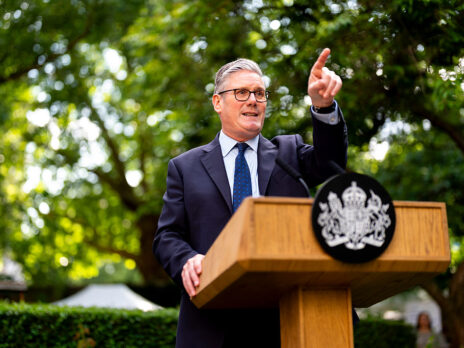
One of the most common yet most difficult political footballs for politicians to control is cronyism, as the government is currently finding out. Labour is scrambling to deal with the connections its preferred candidate to chair the new football regulator, David Kogan, has to the party. Lisa Nandy, the culture secretary, has removed herself from the process of rubber-stamping Kogan’s approval to the post, after he revealed to a select committee of parliamentarians last month that he had donated to both Nandy and Keir Starmer’s respective Labour leadership bids in 2020. (Kogan said the contributions were “very small”; under current political donation rules, they did not need to be publicly declared.) Writing to explain her decision to watch Kogan from the stands, Nandy said she wanted to “avoid the perception of any bias or lack of independence from government”.
On the surface, this appears to be an own-goal by the government, especially one that promised a “total crackdown on cronyism” in the run-up to being elected. And now Nandy is devolving the final sign off of Kogan’s appointment as chair of the new football regulator to… Stephanie Peacock, a junior culture minister, her subordinate. The government has swapped one kind of perceived bias for another: marking its own homework.
But there is undoubtedly some cynicism behind the attacks on Kogan’s proposed appointment. That Kogan is a media executive with extensive experience working with some of English football’s biggest organisations – all affected by the regulator – is almost irrelevant in the eyes of opponents. That he wrote three books about Labour Party history, was on the board of the LabourList political website and declared all these interests unprompted at the first available opportunity is what they think really condemns him.
Despite Kogan’s composed demeanour during his pre-appointment meeting with MPs, where he said he had “total personal independence” from Starmer and Nandy, hysterics ensued. Nandy’s opposite number, Stuart Andrew, called it a clear “conflict of interest”. The Liberal Democrats – with leader Ed Davey briefly pausing any lobbying of Starmer to challenge him to a game of FIFA – called for the culture secretary to “set the record straight, so Parliament can get on with bringing in the much-needed new independent football regulator”. But beyond this furore, the regulator could still prove a massive policy win for Labour. Given the government’s majority, the Bill establishing it – currently making its way through parliament – will pass with ease.
English football, despite a superficially buoyant 2024/25 season, finds itself in a precarious position. Clubs from the multi-billion-pound highs of the Premier League (Everton), and throughout the lower divisions (Reading, Derby County; the now-defunct Bury FC and Macclesfield Town) have all recently fallen victim to poor ownership models and the exorbitant financial pressures. The new football regulator, likely led by Kogan, will be mandated to address this. Get the balance right, and invert the anger fans felt when English football’s sacred pyramid was at existential risk from plans for a breakaway European Super League, and this could be a rare positive for Labour after a tricky first season in government.
There is also an easy counter-attack Labour can hit the Conservatives with. The idea for a football regulator was originally a Conservative policy, its implementation only delayed by last year’s election. Though the “backstop” financial distribution powers the regulator will have in Labour’s revived version of the Bill differs from the previous Conservative offering, the latter’s complete opposition to its own idea even baffles those within its ranks. Stuart Andrew, once the champion of a regulator whilst in government, is now “embarrassed” by the sudden Tory U-turn in opposition, one Labour MP told me. The fact that Kogan was longlisted when he applied for the role under the previous government is another tactical flaw in the Tory offensive against the chair-in-waiting.
While Kogan’s connections to Labour are rightly examined – an independent inquiry is underway – there are otherwise no qualms from those within the game about his skills and expertise. A belief that, in spite of the optics, he is the man for the job. “The antidote to perception is action,” Kogan retorted to Caroline Dinenage, Tory chair of the culture and sport select committee, and her remark about him being seen as the government’s “puppet”. “Why on earth would I want to do [this job] if I thought I was going to be dogged by accusations of political bias and [that] my actions would reinforce that?”
It’s a fair point. But politics, like football, is not based on fairness. It’s a results-based business. As seen with the disastrous appointment of Sue Gray as Starmer’s chief of staff, Labour – and indeed, the Tories – know that when the impression of a dodgy appointment sticks, it can become a burden, often ending in a resignation, and almost always distracting from the ultimate goal. That would be a win for the Tories. But for the millions of football supporters concerned about the future of their clubs, the defeat of Kogan and potentially the regulator would be a devastating loss. If it does fail, then the return of the political football of cronyism would be the least important result from Kogan’s appointment.
[See also: The humbling of Pep Guardiola]





